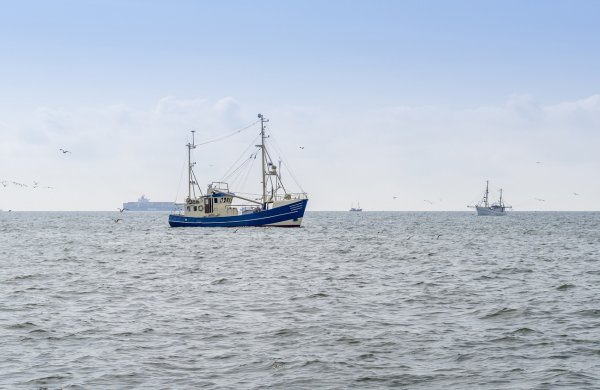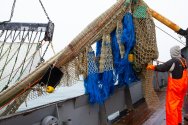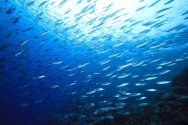
Interview
Research for healthy North Sea fisheries
Many people associate the term ‘sustainable fisheries’ solely with the health of fish stocks: are they being overfished? But various other aspects of fishing also determine its sustainability, from bycatch and disturbance of the seabed to the fuel consumption of the fleet. Scientists from Wageningen Marine Research are studying this complex issue, in collaboration with the fishing industry. Their results have direct relevance for fishery policy and practice.
When it comes to fish, there is an increasing awareness among consumers in supermarkets and restaurants: was this fish caught sustainably? Many people do have ideas about what ‘sustainability’ means in this context, but there are still many questions. For starters, there is no unambiguous definition of sustainable fisheries – and much information is still lacking.
“In Wageningen, we aim to study this issue in the widest possible sense,” says Nathalie Steins, fisheries researcher at Wageningen Marine Research. Her own background is in sociology and governance, disciplines that are just as important in this context as ecology and technology, Steins emphasises. “There is already a lot of knowledge about fisheries biology, ecology and technology,” she says, “but what matters is to what extent this knowledge actually makes its way into practice. What matters is that fisheries researchers sit down with fishers and policymakers, and that together they develop solutions that are meaningful and realistic.”
There is already a lot of knowledge about fisheries biology, ecology and technology, but what matters is to what extent this knowledge actually makes its way into practice. What matters is that fisheries researchers sit down with fishermen and policymakers, and that together they develop solutions that are meaningful and realistic.
Advice on quotas
Exactly this role – building bridges between all those disciplines – suits Wageningen Marine Research very well, says Steins. Wageningen Marine Research develops recommendations for the relevant ministries, always in close consultation with the relevant stakeholders. “I think we are well equipped for that role. This integrated approach, combined with our research collaboration with the fisheries sector, is quite typical for Wageningen.”
One of the biologists who play a role in both research and policy advice is Niels Hintzen. “I'm a quantitative ecologist,” he says. “I deal with figures, models and statistics. For instance, I make data-based estimates of the sizes of fish stocks. Such information can contribute to advice on sustainable quotas.” On behalf of the Netherlands, Hintzen is a member of the Advisory Committee of ICES, the International Council for the Exploration of the Sea.
Hintzen’s work focuses on the sustainability of fisheries management. “This requires good-quality data, derived for instance from surveys at sea,” he says, “and from samples of catches that are brought ashore. In addition, together with colleagues from WMR, I am investigating the impact of seabed disturbance and bycatch. Research into fuel consumption and other socio-economic aspects of sustainability is also important, but this is mainly done by our sister organisation Wageningen Economic Research.” Steins adds: “In the future, I expect we will increasingly look at aspects such as animal welfare. But our current focus is on research into fish stocks, unwanted bycatch and ecosystem impact of fishing.”
What is the combined effect?
It is a complex puzzle, says Hintzen. “We aim to map the entire ecosystem, not just single fish species,” he explains. “That is the only way to reliably calculate the effect of particular fishing efforts. If you catch a certain prey species, this will have an impact on the predatory fish, for instance, and vice versa. This also goes for benthic life and bycatch. We’d like to understand this to such an extent that we can make valid predictions – which is quite a challenge. Ethical considerations are also relevant in this context: how much damage from trawl nets is still in proportion to the socio-economic yield?”
It is impossible to measure and know everything exactly, as both researchers underline. Sometimes they have to make assumptions and estimates based on what they do know. “And then there's the cumulative effect of all those other human activities at the North Sea,” says Steins, “such as the construction of wind farms. This also has an impact on the ecology in those areas. And it’s not just the Netherlands that builds wind farms: our neighbouring countries are doing the same. So what is the combined effect on the ecosystem? And how does the construction of those wind farms affect the fishing industry?”
Innovations in fish monitoring
In the meantime, the fisheries sector is evolving rapidly. There is much innovation, aiming not just at efficiency but also at sustainability. “There are innovations in the field of fishing gear, for instance in how trawls are dragged across the seabed, and in the shapes and sizes of the trawls and meshes,” says Hintzen.
“But there are also significant innovations in the area of data collection: genetic sampling, monitoring with drones and acoustics, image recognition, artificial intelligence and machine learning. These technologies are still in their infancy. And we still know very little about how marine life evolves over time and space, with and without fisheries – but all of this is changing rapidly.”
Innovation is a must for fishers if they want to continue to earn a decent living. “Due to the construction of wind farms, the area of the North Sea open to fisheries is getting smaller and smaller,” says Steins, “and there are increasingly strict requirements with regard to unwanted bycatch and seabed disturbance. And then there is the high fuel consumption in the flatfish trawl fisheries. This has to be addressed if we want to keep the fleet economically viable and to limit carbon and nitrogen emissions.”
Collaborating with fishers for innovation
Ideas for innovation should not just come from science, according to both researchers. “On the contrary,” says Steins. “They have to come from the fishers. After all, they spend most of their days at sea, so they are best equipped to say what is needed and what is possible. And they are the ones who have to work with those innovations. If they come up with something, we join them on board to test it in a consistent manner. Or we bring in knowledge from abroad. It’s a fruitful interaction.”
Here too, it is not just a technical story, Steins emphasises. “It is also a matter of fostering a mutual understanding. Initially, innovation usually means a decreasing yield – and we’re talking about a sector that is already under huge pressure. That is why we also focus on how to motivate fishers to adopt an innovation, for instance through a reward system. This is also an area that calls for innovation.”

Negotiating about fishing areas
In addition, there are increasingly complex diplomatic issues pertaining to North Sea fisheries. Wind farms are one factor, and another is the establishment of protected Natura 2000 areas. Both developments effectively mean a loss of fishing grounds. Closing those areas to fishing may positively affect fish stocks, some say, but is this really the case? “That is a complex matter,” Hintzen replies. “After all, fish don't adhere to boundaries. They may spawn in one place and feed in another. And if fishers are banned from a particular area, they will go somewhere else, where they might fish differently or more intensively. This too can affect the ecosystem.”
Then there is Brexit: the UK is now pursuing its own interests in Brussels. Those interests are not necessarily in line with those of other European countries. “Now we actually see, for instance, that biological advice is being negotiated,” says Hintzen. “This is because the UK is now competing with other countries when it comes to certain fish stocks.”
In addition, climate change is causing some stocks to move north. The question arises whether it would not be fairer if these changes were translated into new quotas for some countries. “Sardines and hake, for example, are now found further north,” says Hintzen. “But not all northern countries have quotas to land these species. Spanish fishers could sell their quota at high prices. You may call this unfair, because species have moved north and it is sometimes impossible for fishermen to avoid catches. It’s a very difficult dilemma.”
Major improvements
The world of fishing is changing rapidly, as both researchers conclude. “Brussels is committed to making policy based on the best available science,” says Hintzen. “That means that you can only make those risk assessments following thorough research. With our work, we provide such knowledge and insights. This allows policymakers to make informed decisions.”
That means that you can only make those risk assessments following thorough research. With our work, we provide such knowledge and insights. This allows policymakers to make informed decisions.
Steins: “People sometimes mistakenly assume that we, the researchers, make those policies. We don’t – we just provide the knowledge. We give advice, but governments are the ones to make the rules and set the quotas.” However, there’s always some level of negotiation when political interests come into play. Hintzen: “People sometimes find that difficult to understand – conservationists as well as fishers. Plus, there is never a one-size-fits-all solution. What benefits one fisher may disadvantage another.”
Steins is optimistic: “There will always be fisheries in the North Sea, but they will no doubt change substantially. There is a large group of fishers who are in favour of change and innovation. By providing knowledge, we can help them in this process. Our main hope that those transitions will be fast enough. Therefore we need active governments to set firm goals and frameworks.”
Hintzen: “And don't forget that some things have already improved significantly in the past two to three decades. 2016 was an absolute peak year in terms of fish stocks in the North Sea. That is only possible in a context of sustainable fishing.”

